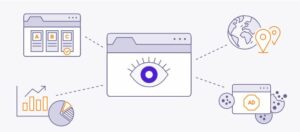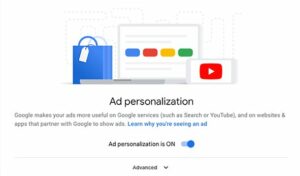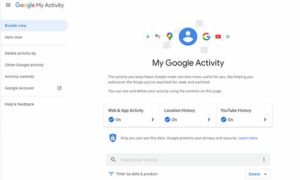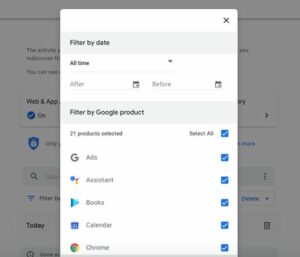What Does Google Do With Your Data will be described in this article. Google is more aware than most businesses these days that knowledge is power. What information about you does Google, though? We’ll break down Google’s privacy policy in this article so you can understand what information is tracked, how it’s used, and how to protect your privacy online.
What Does Google Do With Your Data?
In this article, you can know about What Does Google Do With Your Data here are the details below;
It’s crucial to get knowledgeable about Google’s data usage practices if you use one of their services or products—which you most likely do—so that you can make wise choices that protect your privacy. Google might be observing every move you make and every transaction you make.
Is Google really spaying on me?
The short answer is that Google does indeed gather information on your usage of its products, services, and apps. This includes things like your location history, Gmail and YouTube usage, browser habits, Google searches, online purchases, and more. Basically, data about your tastes and activities is probably collected from anything that is connected to Google.
Many individuals are curious about how Google obtains information and what data it collects. People are especially concerned about voice-activated devices like Google Home and Google Assistant being used for purposes beyond than just playing music in the living room or ordering toilet paper.
In order to personalize your experiences and the material you view, almost every business you contact with online uses web tracking technologies to collect data about your online habits and interests.
Google recording your private interactions with your home assistant is not one of the legitimate security dangers associated with smart home gadgets. Although it may seem like Google is spying on you, in actuality, they only view the data you have knowingly given them access to or entered yourself.
Although it would be easy to paint Google as the bad guy in this situation, data collecting by Google is not unusual. In order to personalize your experiences and the material you view, almost every business you contact with online uses web tracking technologies to collect data about your online habits and interests. Nonetheless, you might be surprised by the sheer amount of information Google genuinely collects and the less evident ways it monitors you.
Why does Google want my data?
I know what you’re thinking: “Okay, Google is very good at knowing me. However, how does Google use my data?Google claims that they use all of this data to personalize your experience, make changes, and provide better services. Stated differently, all of this data aids Google in improving the utility of its services for you. Also check Cryptocurrency is a digital
Google can provide better, more individualized services with the help of data about your behavior and interests. Google uses this information to provide more individualized or better services.
Of course, there’s a very fine line between creepy and beneficial, and occasionally companies err by collecting an overwhelming quantity of data. More data collection equals higher profits for many businesses. Here are some ways that your digital lifestyle may be affected by Google data harvesting.
Targeted advertising
With the information it collects about you from all of its platforms, services, goods, and gadgets, Google is able to create a comprehensive advertising profile that includes your hobbies, occupation, age range, and gender. This enables them to present you with Google adverts that are tailored to your preferences through targeted advertising.
Assume you look for a location to rent skis. Following that, tailored advertisements for similar goods, such as ski jackets, begin to appear on other websites you visit online. You may access your advertising profile by going to your Google account settings, clicking on Data & personalization in the left navigation panel, and seeing what Google believes it knows about you.
Location tracking
Google follows you everywhere. Google analyzes your location to provide personalized choices that are more relevant to your circumstances, whether you’re seeking to discover the closest bus stop, the quickest route to a meeting, or a local cafe. For example, perhaps you’d want to go to the movies after work. You may be able to find the showtimes for movies that are showing at nearby cinemas by searching for listings on Google.
Improving usability
The quality of the service improves with the amount of data. Google uses all of the information it gathers to enhance usability; your data is not sufficient on its own. In order to improve the use of its services for everyone, Google also examines billions of other people’s data from other apps.
When you use Google Maps (or Waze, yeah, it’s a member of the Google family), for instance, Google receives your location anonymously and combines it with information from nearby users to produce a picture of the traffic patterns at the moment. Have you ever had to reroute while driving due to an accident or traffic jam? You can give thanks to all of the info that comes from nearby drivers as well as your own.
Tweaking algorithms
The rules that dictate the results you see and the order in which they are shown are called Google’s search algorithms, and they are always changing. Over 3,500 enhancements to Google search were reported by the firm in 2019; that’s almost ten every day on average.
Google determines the results you get based on information about what people search for, relevant results, and the caliber of the content and sources. Additionally, Google’s engineers work to improve the usefulness of Google’s search engines. For example, they generate featured content snippets from relevant third-party websites that offer fast solutions to frequently asked queries directly at the top of the search results page.
Trendspotting and analysis
Google Trends, a Google website that monitors and examines the most popular search terms across platforms like YouTube, Google Search, and others, is likewise powered by the search results you provide. The most popular search terms from many languages and countries are displayed, assisting you in finding the newest subjects, news, and trends from various locales and eras.
To be clear, nobody at Google (or perhaps even nobody inside) really knows how this data is used or processed. However, they make no secret of what they gather or how they do it. Google has produced a privacy policy that is straightforward to read and comprehend.
Google is open about how it uses your data, but not everyone does so in an understandable way. You may feel, as a consumer or citizen, that businesses or governments know you too well, or at least too well than you would like. Installing anti-tracking software can help you browse anonymously, protect your identity, avoid Google data mining, and prohibit advertising and other third parties from tracking you if you’d like to keep your online activities secret.
The simplest method for increasing your online privacy and blocking intrusive tracking is to use Avast AntiTrack. In order to protect your privacy online and prevent advertising from tracking your activities, it immediately deletes your cookies and browsing history. In order to hide your digital fingerprint from websites and advertising, Avast AntiTrack also does this.
Does Google sell data?
Given the wealth of useful data Google gathers about you, one may think Google is selling your information. However, Google is not a data broker, and it does not sell your personal information. According to Google’s privacy statement, your data will only be shared for the purposes listed below:
- when you allow them to exchange personal data with you.
- if they get requests from the government to exchange data for lawful purposes.
- If your place of employment or education has a domain administrator in charge of your Google Apps.
- when Google requires an associate or outside business to assist with data processing.
However, Google does use your information to assist third parties and advertisers in displaying relevant and targeted advertisements to users of Google products, partner websites, and mobile apps. The Google Safety Center states that they may utilize data that does not directly identify you, such as location history, websites and apps you use, videos or advertisements you’ve seen, and other personal information like your age or gender. Also check Yepic Alternative
How will I know if my data has been shared?
Do advertisements for the shiny new television you were eyeing online last week keep showing up on the many websites you visit? Alternatively, it’s possible that you recently searched for “food delivery services,” in which case you’re seeing advertisements on Instagram to download the DoorDash and GrubHub apps. Your information has probably been shared for the purpose of targeted advertising.
However, you may manage the data that Google uses by going into your Ad Settings. You have the option to check your advertising profile, find out more about the data they gather, stop tailored adverts entirely, or switch off interests you do not want to be included.
Although it will no longer base the advertisements you see in the future on your Google activity, Google will still display ads and gather data about you. Installing an ad blocker in your browser is another way to lessen the number of obtrusive pop-ups and advertisements you encounter while online.
Get Avast BreachGuard for instructions on how to comprehend and modify the privacy settings on your Google account and the other accounts you have. BreachGuard will not only allow you customize privacy settings across many online accounts, but it will also ensure that your personal information is kept out of data broker databases. You can regain control over your data with Avast BreachGuard.
What information does Google have on me?
It’s one thing to know that Google is tracking you. How much information does Google, though? You probably don’t realize how much.
The following types of data are gathered by Google:
- the language or languages you know.
- The items you purchase and your spending limit.
- The locations you search for on Google Maps and your past travels.
- your preferred stores, particularly if you have connected Google Pay to your reward cards.
- Everything that appears in your inbox, including any attachments, emails, and even the content you choose to delete or classify as spam.
- Everything you store on Google Drive, including work papers, receipts for purchases, images, videos, and more.
- Your entire YouTube viewing history, including all of the videos you’ve ever viewed, all of the comments you’ve ever made, and all of the searches you’ve ever done.
- What’s scheduled for the future (as well as all the tasks you completed that were entered into your Google Calendar).
- The apps you launch and the time you launch them (if you’re using an Android device).
- the queries you pose to your virtual assistant.
- every article that appears on Google News.
- Every advertisement you see and click on (whether you see them in mobile apps, partner websites, or through Google services).
It’s safe to argue that Google gathers a lot of data despite the lengthy list. The good news is that you can easily access all of the information they’ve gathered about you and download your Google data.
Does Google store any sensitive or personal information?
In addition to the information listed above, Google is also aware of personal information about you, such as your name, gender, and birthday, as you have provided Google with this information through your Google account as Personal Info. If you’ve stored your home or place of employment in Google Maps, Google is also aware of these locations.
In-depth knowledge of various private facets of your everyday life is also available to Google, in addition to the more evident private information.
From your marital status to your level of job satisfaction, Google can infer a lot about you just by looking at the searches, videos, and articles you read.
Even though Google does not link any of your online profiles to sensitive information like your sexual orientation, race, or other personal characteristics, what you do online can disclose a lot about who you are, whether you want to or not. From your marital status to your level of job satisfaction, Google can infer a lot about you just by looking at the searches, videos, and articles you read.
How does Google obtain your data in the first place?
Although your search results are one of the main sources of information that Google uses to build your data profile, it is not the only one. So, specifically, how does Google gather data? To gather information and get to know you better, they employ a variety of web tracking technologies, including cookies, IP address tracking, and others utilized by the ad tracking sector.
Google uses a technology called IP address tracking to assist in locating you. An IP address is a special combination of letters and numbers that are issued to specific internet-connected devices; it can be used to locate you.
When you visit a website for the first time, your browser stores little bits of code called cookies. Cookies enable websites and other businesses to recognize you and recall your past usage. Cookies are small files that save and keep a lot of information about you. They are used to serve adverts, measure web analytics, and store and serve personalized content.
These are the primary techniques Google employs to follow you. In order to identify you in the future, other companies and advertisements utilize methods such as browser fingerprinting to gather specific data about your device or browser. Companies also frequently use web beacons, sometimes referred to as pixels or tags, to monitor user activity on websites.
Do you want to stop all of these trackers from collecting information about you in the future? Ads can be blocked, cookies can be completely disabled, or you can wipe the cookies on your browser. Certain browsers also have the ability to mask your digital fingerprint and automatically block third-party cookies.
With built-in privacy protection, Avast Secure Browser helps you avoid online tracking and hide your online identity. It prevents websites from recognizing your unique browser profile and instantly removes trackers, allowing you to surf without the impression that someone is observing everything you do.
Can I ask Google to delete my data?
You can indeed remove your data from Google. You can remove all of your search history from your data profile in addition to disabling ad personalization. This can be completed directly from your Google account’s My Google Activity page.
You may manage and remove data using the My Google Activity page.
You can examine every piece of information Google has gathered on you here and remove it by selecting goods and date ranges. To remove every bit of Google data:
- In the navigation panel on the left, select Delete activity.
- To erase all of the product data, check the box next to Select all & choose All time as the date range.
- After selecting Apply, Delete, and it’s gone.
It is more difficult to have your personal information removed from Google search results. Generally speaking, Google avoids involvement unless there is a valid legal basis. To find out more, go to Google’s help page about the removal of personal data.
Keep an eye on who’s accessing your most personal data
Why should it be any different online than you wouldn’t divulge to a stranger where you live or what you purchase? In addition to Google, there are many other businesses and independent data brokers who wish to obtain your personal information in order to make more money, as well as cybercriminals who want to use it for dubious or unlawful activities.
By limiting the information you disclose publicly online, you may restrict the amount of information that businesses can gather about you. Avast BreachGuard can help you do this. By automatically requesting that data brokers remove your personal information from their databases, BreachGuard further guards against information misuse.
Avast BreachGuard also monitors your personal data by searching the dark web to check whether it has been compromised. BreachGuard alerts you right away if your data is exposed so you can be sure you take the necessary precautions. Use Avast BreachGuard to maintain control over your data and ensure that your personal information remains just that—yours.







